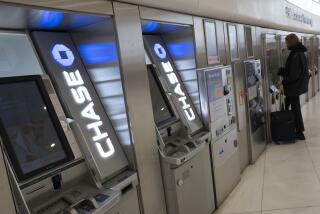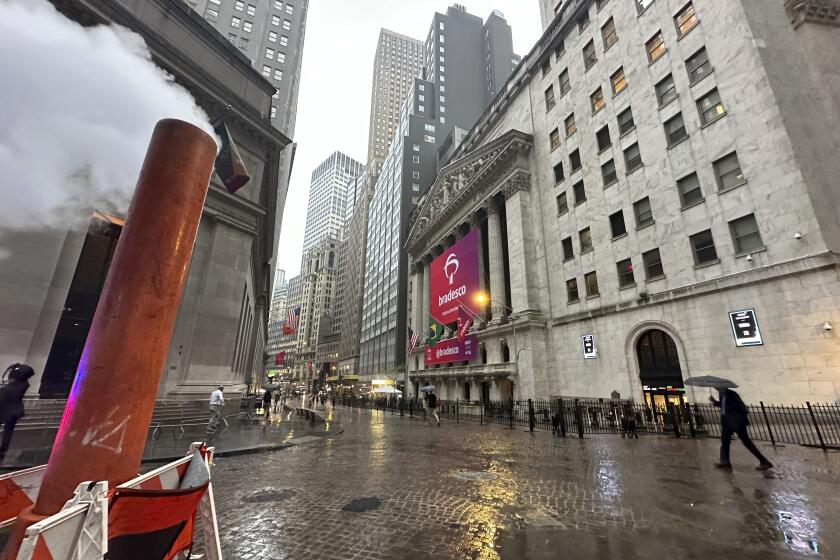A debit of gratitude to Bank of America
This may be a very unpopular thing to say about Bank of America and its planned $5 monthly debit card fee, but it’s worth saying anyway:
Thank you, Bank of America.
The big bank’s move created a consumer furor, with consumer activists proposing boycotts by or mass defections of BofA customers to smaller banks without fees, and the bank itself becoming a popular symbol of the financial industry’s supposed disregard for the average customer.
But its action has a lot to recommend it. First and foremost, it has driven out into the open the real cost of what long has been pitched as a great consumer convenience. That’s a testament to the wisdom of the so-called Durbin amendment, named after Sen. Richard Durbin (D-Ill.), who got it inserted into the Dodd-Frank bank regulation bill last year.
The Durbin measure required the Federal Reserve to impose limits on “interchange fees,” the hidden charges that merchants are stuck with by banks and Visa and MasterCard whenever their customers swipe a debit card to pay for merchandise.
As Fed Gov. Sarah Bloom Raskin observed earlier this year in congressional testimony on the measure, most consumers have been unaware of interchange fees and some critics have questioned the need for “their very existence.” In part that’s because debit cards, which directly access the money in a consumer’s bank account, are functionally equivalent to paper checks, which customarily don’t generate such fees.
What consumers may not realize is that these fees are invariably passed on to them in the form of higher prices at the register. Consumer advocates had pointed to the swipe fees as the sort of expense that fell disproportionately on the neediest consumers, who have had few ways of avoiding them. Because they were charged, so to speak, under the table, no one really knew how high the fees were or what relationship they bore to the true cost of the transaction. No one, consequently, felt any incentive to fight them.
The Durbin rule has changed all that. Instead of the hidden swipe fee, Bank of America and its industry cousins are forced to be upfront about the bounty they extract for use of a debit card. It’s always best for consumers to know what they’re paying for and how much, because customers can then shop around for cheaper services. The Durbin rule also outlaws some of the exclusive arrangements by which Visa and MasterCard, which markets debit cards under their brands, bound merchants to using their arguably overpriced networks.
Guess what? In just the last few days, Los Angeles-based City National Bank and Chula Vista-based PacTrust Bank have announced they’ll forgo debit card fees for their customers, at least for the moment.
We’ve already seen this principle at work in industries other than banking. Airlines, for example: The emergence of fees for checked luggage, as onerous as they may be, has provided an opening for some airlines, such as Southwest, to compete in the new pricing category.
The swipe fee system for debit cards defined opacity. Visa and MasterCard firms lined up banks to issue the cards and merchants to accept them, and handled marketing campaigns aimed at persuading consumers to use them instead of cash or checks by portraying cash customers as squares or rubes. (Of course, without disclosing that using debit cards isn’t free.)
They also fixed the interchange fees for their bank clients, who pocketed the largest share. This gave Visa and MasterCard an incentive to jack up the fees over time as a way of attracting banks to their networks. This price-fixing, as Durbin related to JPMorgan Chase Chief Executive Jamie Dimon in a blistering letter in April, was “entirely unregulated.”
By 2009, according to a Fed survey, the fees generated $16.2 billion in annual revenue, of which $11 billion went to the banks and the rest to Visa and MasterCard. Is there any doubt why the big banks pushed hard against the Durbin measure, with Dimon calling it “price-fixing at its worst” and “downright idiotic” (prompting Durbin’s riposte)?
The fees came to bear no relation at all to the actual cost of processing a debit transaction. The average fee charged per transaction was 44 cents (with the average transaction about $38), but the Fed survey pegged the true average cost per transaction industrywide at 13 cents per swipe — and as low as 4 cents after factoring economies of scale enjoyed by banks with large numbers of transactions.
The Fed settled on a cap of 21 cents per swipe, plus a bonus of .05% of each transaction. For a $38 purchase, in other words, the fee would come to 23 cents, about half the old average.
So the big banks are determined to make up their loss through upfront fees. Judging from Bank of America’s plan, which will go into effect next year, these won’t bear any closer relationship to the true cost of a debit card swipe than the old. BofA says it will impose the fee on any customer who makes even a single debit card purchase in a given month (ATM transactions remain free). Make one purchase, and it’ll cost you five bucks. To bring the per-swipe fee down to what the Fed says is the bank’s real cost, you’d have to make somewhere between 40 and 125 purchases that month.
Bank of America shows in other ways that it regards its customers as math-challenged. It says they’ll avoid the fee if they keep $20,000 in their combined BofA accounts. Is this supposed to be a bargain? Let’s see. You could deposit that sum in an online deposit account today and earn 0.85%, which translates to about $14 a month in interest forgone by tying the money up with BofA. To be fair, some BofA accounts pay interest on the deposited balance — as little as a tenth of a percent a year, according to its rate card. In that case, the bank would be paying you back $1.67 a month.
It shouldn’t be a surprise if the bank’s announcement drives lots of its customers away, to credit unions and regional banks poised to welcome them with low-cost or no-cost debit card services. That’s the virtue of price transparency in our system of free enterprise, and for that the proper response may be: Thank you, Sen. Durbin.
Michael Hiltzik’s column appears Sundays and Wednesdays. His latest book is “The New Deal: A Modern History.” Reach him at mhiltzik@latimes.com, read past columns at latimes.com/hiltzik, check out facebook.com/hiltzik and follow @latimeshiltzik on Twitter.







